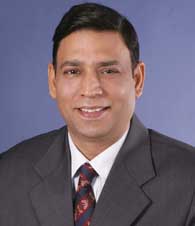|
Executive Interviews: Interview with Anil Bharadwaj on Managing Troubled Times
March 2009
-
By Dr. Nagendra V Chowdary
 Anil Bharadwaj
Anil Bharadwaj Anil Bharadwaj, Secretary General, Federation of Indian, Micro and Small & Medium Enterprises 
Do you think it’s a wake up call to
all those countries (like India) where
the economic growth is led majorly
by one industry, for example, IT
industry in India?
I think this perception in itself is
flawed that growth in India has been
led by IT. What IT industry did was
remarkable for India in the sense that
it bridged our trade gap and provided
a sustainable solution to our foreign
exchange shortfall. The growth in
Indian economy however was fuelled
by its demographic profile – more
young people in working age, which
created demands for all kind of
products on a long-term basis. With
adequate finance and liberal policy
regime, growth in India will remain
high for a long time.
|
|
The
fundamental Indian story is intact.
Secondly, India is not at all an
industry-driven country: its
industrial profile is fairly diversified.
To put things in perspective,
contribution of one single
manufacturing giant—Reliance, to
India’s GDP, is much greater than of
entire India IT/ ITES industry
combined. What’s your assessment of Satyam
Computers’ corporate fiasco? Who
according to you are at fault? What
lessons do you think India Inc.,
should learn from this disastrous
episode?
To the extent I have followed up the
events in media, it looks like a fraud
of giant proportions. It has made a
mockery of corporate governance and
regulatory mechanisms in India. At
the same time, I feel no matter how
tight the regulation is, we need to
intelligently reverse the risk-reward
mechanism against such fraudulent practices. As and when such cases
surface, the action should be swift
and exemplary to make it known to
all that attempting such things are not
worth the trouble. Do you think it has caused an
irreparable damage to India Inc.'s
global image and especially, Indian IT
sector? If yes, what corrective and
remedial steps should be taken?
The Satyam’s saga and the World
Bank censures on some IT companies
do cast a shadow on the practices of
Indian IT companies. Preempting
rumors through sincere disclosures is
the best way forward. I think a cue
could be taken from Infosys in this
regard. One important lesson is that
in India at the end of the day value
system of the promoter of the
company is of greater importance
than the weight of the board. Nearly 55,000 employees are on
Satyam Computers’ payroll. All of
them are crestfallen with this crisis
coming amidst US financial crisis.
Satyam Learning Centre (headed by
Ed Cohen from Booz, Allen &
Hamilton) has been busy last few
weeks trying to calm them down and
rally all of them around a critical
mission to turn things around. What
would be your advice to Ed Cohen
and his team to make a meaningful
impact on the employees’ morale and
commitment?
I think swindling of physical assets of
Satyam by a couple of top guys
cannot fail it, but exodus of its real
assets – its people, will fail it
permanently. If the flock remain
together, the company would
definitely see a turnaround for better. One of the biggest casualties of this
crisis is business schools'
placements. The students are a
worried lot.What is your advice to all
the students waiting for “mera
number kab ayega?”Many have taken
loans, while some have put their
hands into their parents’ hard earned
life- time savings? And everything
seems to go disarray. How should they go about steering themselves out
of such traumatic times?
Year 2009-10 is really tough for
passing students. But it is tough for
all of us – businesses, bankers,
employees. I think there is no need to
be panicky but to be realistic. Indian
economy has the size to sustain
growth over 6% even in these trying
times when developed economies are
actually shrinking. Unfortunately
many of our business schools create a
very unrealistic picture in the minds
of students. The media hype on
salary offered to students of different
business schools creates a complex.
Some correction was warranted. The
era of fancy salaries in investment
banking and finance is over. MBA
students should realistically compare
the salaries with entry levels salaries
of production engineers, scientists
and teachers. Ultimately salaries are
proportional to the value addition
you make to organization. If you are
realistic and ready to work hard your
way, in India "tumhara number
zaroor ayega".
1.
Troubled Times Case Study
2. ICMR
Case Collection
3.
Case Study Volumes
|
The interview was conducted by Dr. Nagendra V Chowdary, Consulting Editor,
Effective Executive and Dean, IBSCDC,
Hyderabad. This interview was originally published in Effective Executive, IUP, March 2009. Copyright © March 2009, IBSCDC
No part of this publication may be copied, reproduced or distributed, stored in a
retrieval system, used in a spreadsheet, or transmitted in any form or medium –
electronic, mechanical, photocopying, recording, or otherwise – without the permission
of IBSCDC. |
